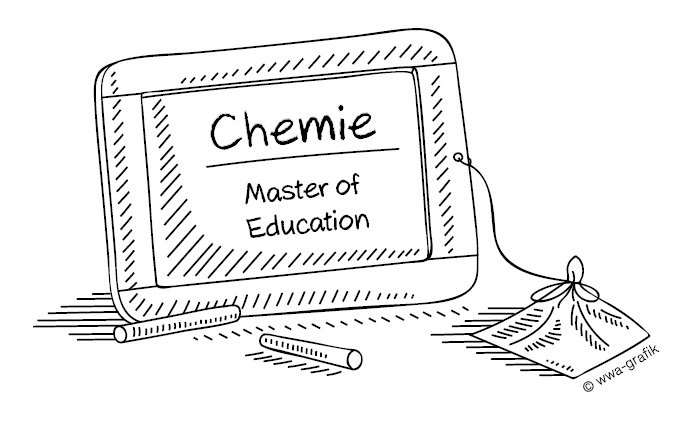Chemistry – Master of Education (Secondary education)

The Master of Education (MEd) in Chemistry follows the Bachelor of Education (BEd) and complements your teacher education Lehramt Gymnasium. After earning your MEd, you can be admitted to the teacher traineeship (“Referendariat”).
The teacher education programme in chemistry at the University of Konstanz offers broad scientific training and prepares you for your future profession as a teacher. During your master's studies you will attend elective modules and courses in the area of teaching methodology to deepen your knowledge.
Overview
| Degree | Master of Education (Secondary education) |
|---|---|
| Programme start | Winter semester & Summer semester |
| Period of study | 4 semesters |
| Application period | 09.05. - 15.07. | 29.11. - 15.01. |
| Admission restrictions | no |
Why study Chemistry in the University of Konstanz?
You will benefit from the short distances within our campus. You can attend lectures and seminars consecutively and do not need to plan in long travel routes. If by chance some of the classes in your subjects do happen to overlap, the department is always there to help you organise your studies. You will study in small groups and learn in a friendly atmosphere. In your core studies you will deepen your knowledge, complemented by a number of elective modules. You will find more detailed information about the specifics of the chemistry study programme on the department’s webpages. On the Department's Information Day you will have the opportunity to talk to teaching staff and get to know the university and the chemistry department. We recommend all of our prospective students to take part in the Information Day.
Content
Prospects and opportunities
Career prospects
Once you have earned the degree Master of Education you can apply for the Referendariat (18 months of teacher traineeship) in Baden-Württemberg (and under certain conditions in other federal states, too). At the end of the Referendariat you will take the Staatsexamen (state examination). Having passed this state examination, you may apply to work at a public school in Baden-Württemberg (and, in certain circumstances, in other federal states).
You will find further career perspectives in the interview series #dreamjob - Starting a career. Here, alumni of the University of Konstanz report on their personal career entry.
Programme structure
Programme start
Winter semester & Summer semester
Academic structure
The master’s programme usually takes four semesters to complete. Graduates are awarded the academic degree of “Master of Education”. You will be taking two major subjects as well as classes in educational science including a practical teaching semester. A total of 120 ECTS credits (cr) is required.
You can find an overview of teacher education here.
Erweiterungsfach (additional subject)
If you are enrolled in a Master of Education programme, you may opt to study an Erweiterungsfach (additional subject) as a separate master's programme. You can start taking courses in your additional subject during your Bachelor of Education programme and even complete the relevant coursework and performance assessments. These may be recognised once you start your Master of Education programme. Please consult the director of the departmental administration first.
You can study one of these as additional subjects:
- Computer science (120 ECTS credits)
- German (120 ECTS credits)
- English (120 ECTS credits)
- French (120 ECTS credits)
- History (120 ECTS credits)
- Italian (120 ECTS credits)
- Latin (90 or 120 ECTS credits)
- Mathematics (120 ECTS credits)
- Philosophy / Ethics (120 ECTS credits)
- Physics (120 ECTS credits)
- Russian (120 ECTS credits)
- Spanish (120 ECTS credits)
The following subjects are not available for study as additional subjects: biology, political science, sport, economics.
Please check the Exam regulations (partly in German) for more information about the programme structure.
Internship and study abroad
Internships
You will complete a practical teaching semester (12 weeks) during the master's programme.
Study abroad
We recommend that you spend at least a few months abroad to acquire language skills and intercultural competencies that supplement your study programme. At the University of Konstanz, we offer a number of opportunities for completing parts of your study programme or an internship abroad. Your departmental student advisory service and the International Office will be happy to support you in this.
Impressions from students and lecturers
Hear from students and lecturers
In our interview series, students talk about their subject, teachers explain the department's research and tell you what topics they cover in seminars and lectures.
- Three Questions to Sophie, B.Ed. Chemistry
- Three Questions to Daniel, B.Ed. Chemistry and German
- Three Questions to Ida-Maria, B.Ed. Chemistry and Maths
- Three Questions to Marcel, B.Sc. Chemistry
- Three Questions to Samuel, B.Sc. Nanoscience
Get an impression
Discover online lectures and websites with more information about your prospective subject.
Requirements
What interests and skills should I have?
You are not afraid of working hard with patience and determination, you enjoy experimenting and are able to theoretically analyse complex interrelationships.
As a teacher you need a variety of skills and competences. You should of course be fascinated by the contents of your subject, and at the same time enjoy sharing your knowledge with your young students. You will need to be able to develop teaching concepts, sometimes with your teacher colleagues, and you will need to demonstrate a high level of educational skills in your daily work with children and adolescents. In addition to this, you will need a variety of social competencies. These include communication skills, conflict ability, resilience and the ability to inspire and motivate. These skills will also help you when interacting with parents. You are basically responsible for creating a positive learning environment which enables your school students to develop and become well-equipped for the challenges of the future.
Language skills
Required language skills
You do not have to proof any foreign language skills.
Required German language skills
International applicants need documentation of their German language skills, level DSH-2 or TestDaF 4, or a language test recognised as equivalent. Alternatively you can submit recognised school certificates. The University of Konstanz does not offer preparatory German language courses or approved German language exams. For this reason, you must submit accredited proof of your German language skills along with your application.
Language(s) of instruction
The language used in class is German. Coursework and performance assessments are to be completed in German.
Admission requirements
We will publish the admission requirements soon.
Fees
All students enrolled at the University of Konstanz are charged a semester fee each semester, similar to all other German universities. Here you can find the current semester fee and its individual components.
Tuition fees for first degree studies for certain international students
Since winter semester 2017/18, the state of Baden-Württemberg has required some international students to pay tuition fees for their first degree studies. The following students are not required to pay tuition fees: citizens of a country within the European Union (EU) or the European Economic Area (EEA), doctoral students and certain “Bildungsinländer” (e.g. non-EU citizens with a German “Abitur”). More detailed information can be found here.
Each year, the University of Konstanz grants exemptions to a limited number of particularly gifted international degree-seeking students in accordance with the university’s “Begabtenbefreiungssatzung” (statutes governing the exemption of gifted students). More detailed information can be found here.
Tuition fees for second degree studies for all students
All students are required to pay tuition fees for their second degree studies. More detailed information can be found here.
Application and application documents
The Master of Education in Chemistry has no admission restrictions.
An application is possible during the following period: 09.05. - 15.07. (winter semester) and 29.11. - 15.01. (summer semester). There may be other deadlines if you are applying for admission to a higher semester (for instance, if you are changing subjects or universities). For more information please consult the university website.
Application documents
You will find an overview of the required application documents in your application for admission, which you will receive at the end of your online application.


